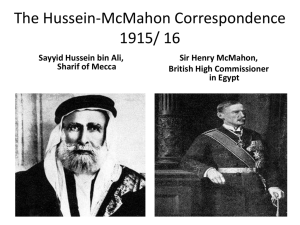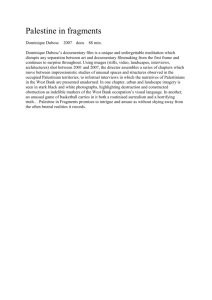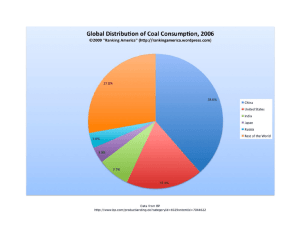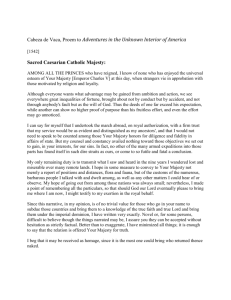(c) crown copyright Catalogue Reference:CAB/24/270 Image Reference:0002
advertisement
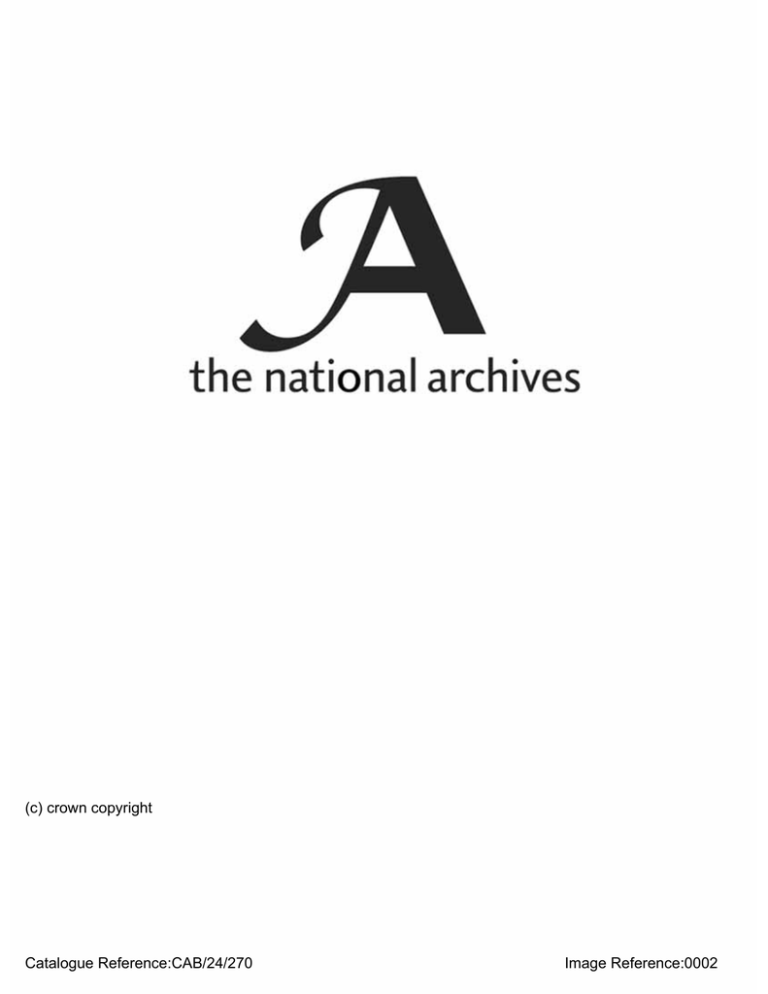
(c) crown copyright Catalogue Reference:CAB/24/270 Image Reference:0002 THIS DOCUMENT IS THE PROPERTY OF HIS BRITANNIC MAJESTY'S GOYERNMENT .* * Printed for the Cabinet.. SECRET; M June 1937. " ll W ' "CopyNo. C P . 169 ( 3 7 ) . CABINET. PALESTINE: REPORT Memorandum O F T H E R O Y A L C O M M I S S I O N , 1936. by the Secretary of State for the Colonies. ^ I C I R C U L A T E herewith, for the information of my colleagues, in connection with the D r a f t Statement of Policy on the R e p o r t of the Royal Commission for Palestine contained in p a r a g r a p h 17 of C P . 166 (37), which is on the A g e n d a P a p e r for the meeting of the Cabinet on Wednesday, the enclosed extract from a letter from General Sir A r t h u r Wauchope to Sir Cosmo P a r k i n s o n , A s s i s t a n t Under-Secretary of S t a t e in the Colonial Office, enclosing one to the H i g h Commissioner from Major-General Sir J o h n Dill, General Officer Commanding i n Palestine. (Initialled) W . O. G. ; Colonial Office, Downing June 28, 1937. Street, APPENDIX. Extract from a semi-official letter from the High Commissioner Sir Cosmo Parkinson, dated June 15, 1937. * * * * for Palestine to *- I shall be very sorry when Dill leaves a n d I hope his leaving m a y be postponed till we see w h a t the reaction is to H i s Majesty's G o v e r n m e n t s decisions. D i l l would like to stay if troops are needed this A u t u m n . , I cannot foretell. M a n y people t h i n k the A r a b s will not take action for a year or two when E n g l a n d is i n some difficulty. / do not think there will be a sudden explosion, but it will be a severe shock to A r a b n a t i o n a l feeling if a q u a r t e r million Arabs are placed in a J e w i s h State. The other day when Dill and I were discussing the chances of disturbances this year, Dill said he felt strongly t h a t the A r a b s were. at present in such a n excited state they ought to be given time to quieten down. I, s a i d H i s Majesty'^ Government would find 'it very difficult to delay giving decisions. 'Hf: replied i n effect that decisions should be given now, b u t decisions alone would hot cause a rebellion, and action to implement the decisions should be delayed. I asked if he would let m e have his views i n w r i t i n g . H e d i d so a n d as I considered them valuable; I' asked i f I m i g h t send his letter to the Secretary of 43 State. Dill readily agreed and I enclose a copy of his thoughtful letter; Dill said he m i g h t send a copy of his letter to G.I.G:S.v - \ ,v-'\' i T h e views of the General Officer Commanding as to future disturbances should be ikhowh and considered, more especially since I believe t h a t when disturbances do break out, I t h i n k it probable much more help will come from Syria^than before. /; n * Letter * * * * from the General Officer Commanding in Palestine Commissioner, June 14, 1937. "" * to the High (Secret.) My dear Wauchope, . T h e other day we talked of the difficulties of finding a satisfactory permanent solution to t h e Palestine Problem in the present tense atmosphere. I t may be of some assistance to you if I attempt to develop on paper the views I then expressed. - I have been t h i n k i n g a good deal lately about this question, with a view to a r r i v i n g a t its p u r e l y military implications, but it seems to me impossible entirely to separate the m i l i t a r y from the political aspects. If therefore I touch upon political matters which are.outside my province I hope you will forgive me. A m a i n consideration seems to be the importance of avoiding another Arab rebellion, if this c a n be done without jeopardizing British interests and without dishonouring British pledges. This is particularly i m p o r t a n t when all our m i l i t a r y energies should be directed towards t h e rehabilitation of our depleted defences, a n d when certain foreign powers, Italy in p a r t i c u l a r , may be expected to do all in their power, short of t a k i n g overt action, to exploit our difficulties. No solution to the Palestine problem which the Royal Commission can reasonably recommend is likely to prove acceptable to t h e A r a b s in their present mood. That does, not mean that they will immediately rise in rebellion when the Royal Commission's Report is known. I t is, in fact, unlikely t h a t they will do so as long as the decision taken does not involve immediate action. T h e A r a b dislikes quick decisions, but while a question is p a r t i a l l y open he is not; disinclined to talk, a n d t r u s t t h a t something will t u r n up to prevent unpleasant consequences for him materialising. To a quick comprehensive solution to a n y problem he will react unfavourably, and when the problem concerns the regulation of his whole future he is likely to react violently. H e is. a leisurely man and believes in arriving a t decisions gradually and by a process of bargaining. Should, then, the policy adopted by H i s Majesty's Government be announced in peremptory and irrevocable terms, the A r a b s are likely again to resort to violent methods of protest. I t may be t h a t the advantages of arriving quickly a t finality on the Palestine issue would outweigh the risks involved in doing so. Such a course would have the immense advantage of having a clear irrevocable policy established, if necessary by force of arms. A n end would be p u t a t once to years of uncertainty. The alternative is t h a t H i s Majesty s Government, while laying down an unequivocal policy, should allow a reasonable period for its g r a d u a l establishment. The temperature of the body politic in Palestine is at present too high for the s t r a i n of drastic treatment, which may be necessary for its ultimate well-being, to be withstood without grave risk. A n intervening period, lasting some three to five years, of relatively t r a n q u i l recuperation might therefore be a wise precaution. A r e q u i s i t e . t o recuperation in this period would be a conviction in the mind of the A r a b t h a t his position in Palestine is assured for the immediate future, and this could h a r d l y be achieved except by an explicit maintenance of the existing relative positions of the two contending r a c e s - A r a b and J e w . Shortly, my opinion is t h a t peace in the near future in Palestine can best be promoted by a period of recuperation precedent to the establishment of His Majesty iis declared policy, and that, unless there are overriding political considera­ tions, unknown to me, t h a t make such a course inexpedient, I am convinced that by this means the u l t i m a t e policy of H i s Majesty'.s Government can be established no less surely. "::. ' j Yours ever, J . G. D I L L . 5

